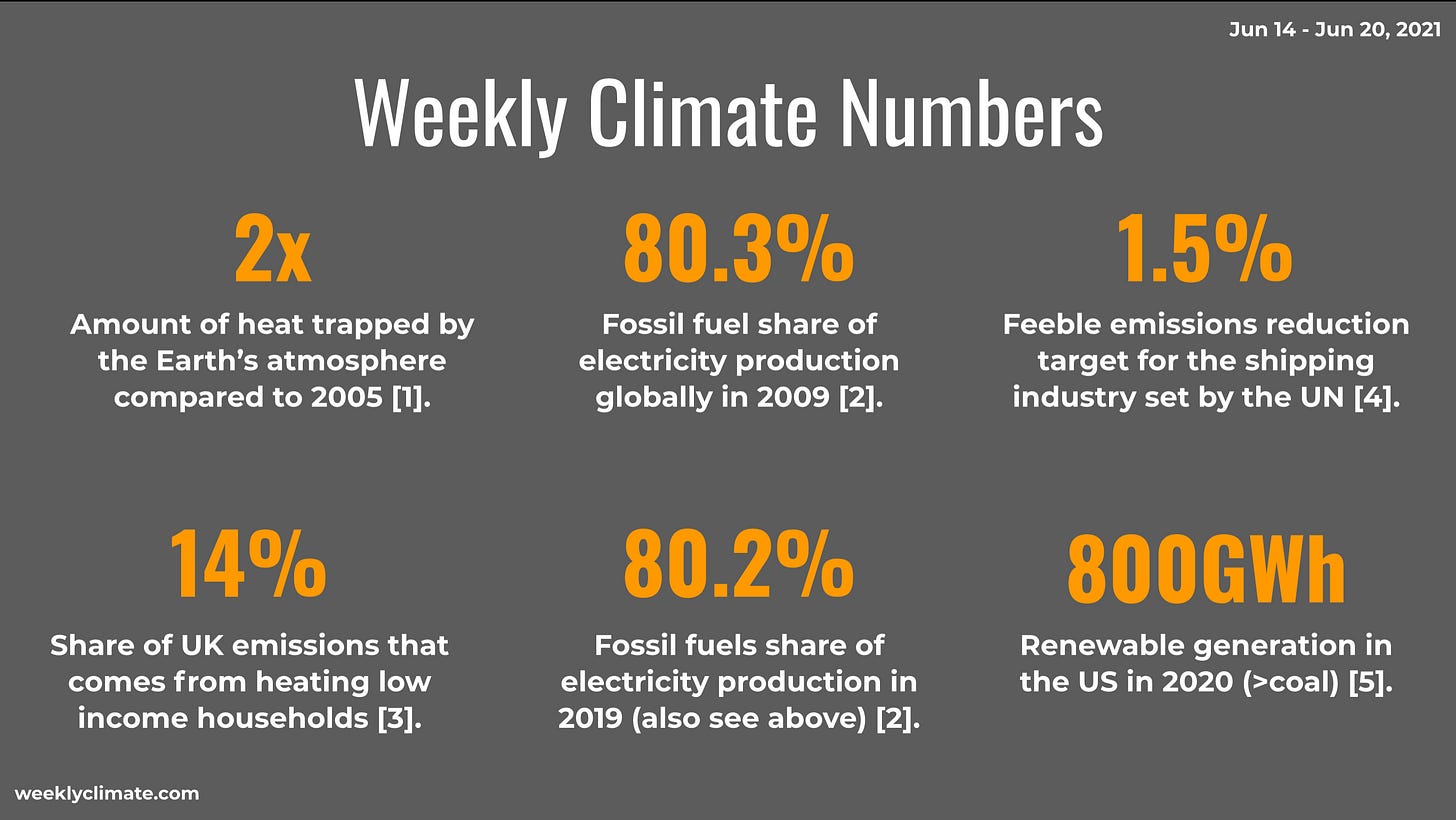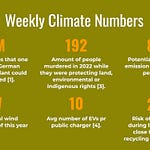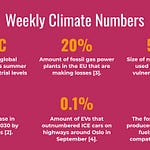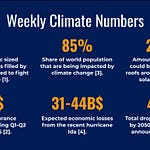Welcome to this week’s edition of The Weekly Climate 🎉
References: [1], [2], [3], [4] and [5].
🦉Twitter Spaces topic of the week
Carbon Offsets
This is highly related to the last week’s discussion on net-zero vs real-zero and to the discussion the week before about agriculture. And I feel the news story this week about the carbon neutral boat with fossil gas warrants a discussion of what the heck is going on with offsets. What are they? Are they good for anything? Which are good? Can we make them good etc?
Search for #twitter below to see which articles is included in that. Also check out previous newsletters which the past few weeks has had a lot on #netzero. Here’s a link to the Space on Twitter (click on it on your mobile phone and you will be able to set a reminder) and be sure to follow me there to not miss more great climate content 🐧. We had a few tech issues last time on Twitter Spaces but we are going to give it one more chance as I still feel the climate discussion is more lively there than on Clubhouse and we did also see quite an uptick in participants this time.
Click the link in this tweet to set a reminder. Exact time and date TBA but we’re targeting Friday afternoon at this point.
‼️News you can’t miss
Here’s one important scary/bad (🙀), good (😻), interesting (😼) and fossil (💩) news item.
🙀 The Earth’s atmosphere is trapping 2x more heat compared to 2005.
😻 A look at the strategy employed by the lawyer who recently beat Shell in the courts.
😼 A nerdy look at how to produce salad.
💩 A look at Bolsonaro’s attack on climate.
👩⚕️ Status: Climate & Science
Let’s look at how we’re doing this week!
[#energybalance] — The Earth’s energy balance is a metric that looks at how much energy that hits the Earth from the sun and how much is bounced back into space. Due to greenhouse gases the Earth absorbs more heat than is bounced back — that’s a good thing, because it would be frigid cold here without. But it’s not good that the Earth absorbs 2x the amount of heat today than it did just 16 years ago in 2005!
📰 The 7 Grand Challenges
⚡️Decarbonize Electricity
Clean electricity is the one do-or-die challenge we must solve.
[#fossilshare] — So how are we doing in terms of reducing the amount of fossil fuel capacity on the global electricity grids? I thought we were doing pretty well. But a new report by REN21 has got me thinking differently. While we sure have higher renewable capacity on the grid today than in 2009 (which the report looks at) the share of fossil fuel based generation is the same: 80.2%. This seems to indicate the renewable energy isn’t really replacing fossil fuel generation but more taking care of humanity insatiable thirst for more energy. Check out key messages from the report here.
[#wave] — Here’s a deliciously geeky deep dive on small wave energy power plants and how they can be stepping stone for wave energy in general. It looks at currently technologies and how they work.
[#investing] — According to a US sustainable investment initiative, investor confidence in renewable energy hits an all time high. The initiative launched in 2018 attempts to gather 1T$ in renewable investments and so far 1/6th of that has been reached (~167B$) and that’s despite a 20% decline in renewable energy investments in 2020. Of the investors surveyed 68% plan to increase their investments in renewable energy.
[#us] — And some good news. According to new numbers from the US released last week, renewables overtook coal generation in 2020 just barely. Both clocking in at around 800GWh (although that does include biomass).
🏘 Reduce impact of urban and rural areas
Lowering the impact of urban and rural areas.
[#buildings] — The UK is currently working on a new heat and buildings strategy. And one of the items being discussed is to equip low income households with free heat pumps. 14% of UKs emissions are attributable to heating low income households which are due to the heating source but certainly also due to energy inefficiencies in the buildings themselves. Also just slapping on a heat pump doesn’t make it green, but it’s a good start and sounds like a great initiative.
[#megadrought] — The New York Times looks at the megadrought currently hitting the western US and observes that the only thing that makes this year different is the severity. Drought is a “normal” condition for the west these past decades. In fact, it’s well-known that the west is in what’s called a megadrought which can last for decades.
[#steel] — A new collaboration between sustainable steel maker SSAB and Volvo puts Volvo on a path to start using fossil fuel free steel in their cars. Commercial production is expected to start in 2026.
🛁 Clean non-electrifiable activities
Some activities we do today can’t be electrified, these must be cleaned some other way.
[#shipping] — The fossil fuel lobby should pat itself on the back for this one. Well done. The UN agrees on a feeble 1.5% annual carbon emission reduction target for the shipping industry.
[#aviation] — By 2030, all jet-engines made by Rolls-Royce will only run on synthetic sustainable aviation fuels. Seems a bit like hand-waving though as AFAIK many of these fuels are drop-in replacements from existing fossil fuels.
[#hydrogen] — Here’s a deep dive into hydrogen as an aviation fuel. The article argues that hydrogen is the strongest bet for a renewable aviation fuel. It also presents Airbus’ plans in the area. One caveat though is that we need to amp up renewable hydrogen production by a crazy amount to do this. But it for sure does look like one solution to the aviation problem.
[#aluminum] — Here’s a look at how to make green aluminum. There are various ways and basically this article argues that it’s already cost competitive with non-green aluminum.
🌳 Protect and grow nature
Nature is our ally, we must protect it and help it help us.
[#salp] — Meet the humble salp. A salp is a jelly-like sea creature who swim around at night and eat phytoplankton which during the day has sucked up a lot of CO2 by photosynthesis. During the day the salp go down to about 1000m to hide from predators and poop out tiny carbon containing pellets from their phytoplankton dinner, which sink rapidly and thus can be considered as a strong carbon sink. The salp themselves when they die also sink rapidly. It’s estimated that salp removes 2B tons of carbon every year.
[#wildfires] — The summer hasn’t even begun but already the western US is seeing an increasing amount of wildfires. This season is expected to be a bad one due to the extreme heat and drought in the region.
[#bloodglacier] — Snow in the alps are turning red in what’s known as “blood glacier”. The cause: Algae blooms. It is believed that the increase concentrations of CO2 are making the algae bloom more than usual.
🍽 Optimize food
Without the lower impact of food or drink the hero doesn’t work (modified old danish proverb).
[#zimbabwe] — Here’s how a seemingly simply thing as cellular coverage is causing trouble for drought stricken farmers in Zimbabwe. While cellular coverage is at 87% some rural farmers don’t get regular weather updates, which in a recent example has cost multiple farmers a ruined crops.
[#salad] — A very interesting look at various ways today to produce salad and what will happen to those in the future. From high-tech vertical farming to more traditional methods.
[#insects] — Inside Climate News look at the latest in the intersection between insects and food. It’s been awhile since I last heard about an insect food startup, but apparently, the space is getting hot again for entrepreneurs. It’s a sector that seeing increasing funding from VCs. Globally more than 200M$ was invested in insect startups in 2020.
⚖️ Climate Justice
Without justice there’s no future.
[#lawsuits] — The environmental lawyer who won the case against Shell on May 26 has prior to winning the case against Shell written a book on the exact strategy that he used to win the case. The book is called “Revolution Justified: Why Only the Law Can Save Us Now” and ranks pretty low on Amazons Kindle store, still sounds like an interesting book that most lawyers should probably read.
📦 Other / catch-all
All the other stuff that I couldn’t fit into any of the other categories, than the other category.
[#ai] — This week’s 🎧Interchange podcast looks into how AI can support climate tech. AI’s powerful data analysis and predictive features are expected to help in a wide variety of applications ranging from building management to analyzing transition risk for companies. One thing though that’s important for AI companies to observe is their carbon footprint as GPUs used to train most advanced AI models are quite hungry when it comes to power consumption.
[#comms] — Heated raises a very interesting point which I myself was guity of. On Big oils bad day a couple of weeks ago almost all the headlines was framed as “big oils bad day”, i.e. as something negative for the fossil fuel industry (which it was). But the other angle is that it was a great day for everybody else, humanity, nature, the planet. Why didn’t anybody (apart from Heated) chose the framing?
[#environmentprize] — Goldman’s environment prize winners was announced last week. This article looks at who they are. Right from a coal fighter to a Vietnamese protector of pagolins.
⭐️Special Topics
🎩 Global and local policy
We have a special interest in covering the major global and local policies regarding climate, whether good or bad.
[#brazil] — In this profile Heated looks at the person with likely one of the highest amount of power over our climate: Brazil’s president Jair Bolsonaro. Heated looks at all the ways he’s supporting the deforestation of the rain forest from reducing Brazil’s environmental budget to encouraging slash and burning by farmers raising cattle.
[#biden] — A federal judge has blocked Biden’s attempt to stop new oil and gas drilling leases on public lands. This is the first legal roadblock that Biden has incurred so far. The ruling says that stopping such leases can only be controlled by the Congress.
[#g7] — The G7 meeting was held last week and probably the biggest disappointment from the meeting was that the group did not come to an agreement regarding when to end coal. The coal industry is expanding rapidly in China and the disagreement on this will make it much easier for China to not do anything about it’s coal use. In addition, G7 was a classic re-statement of goals, but according to experts, total lack of funds and action.
⛽️Major Carbon Emitters
We have a special interest in covering the moving of the major carbon emitters as these are the key roadblock to climate action.
[#oilaction] — Shell’s CEO recently went to LinkedIn to make it clear that cutting Shell’s scope 3 emissions to zero wouldn’t solve the climate problem because people would just buy their gasoline and diesel some other place. It’s a classic argument, that it’s up to you and me. So Akshat Rathi of Bloomberg examines what the oil majors can do to reduce the demand for oil and in short it comes down to the things they do the least.
[#pipelines] — The Keystone XL pipeline maybe buried for good, so which pipelines should we target next? An obvious choice seems to be the Dakota Access pipeline, which the article looks at.
[#pr] — Gizmodo looks at a new trend among fossil fuel companies, which is engaging and sponsoring instagram posts from highly popular instagram influencers, hereby creating a new horde of big oil instagram influencers. A similar tactic which have worked so well for the gas industry.
[#military] — NATO is highlighting the highly polluting nature of military opportunities by planning to go net-zero by 2050. The US, EU and UK military together accounts for 95Mt of CO2 emissions annually.
[#netzero, #twitter] — And we’re ending with an article that is very relevant for our discussion on Twitter Spaces about net-zero vs real zero. In it Salon reports how Shell triumphantly is transported a larger tanker ship filled to the brink with fracked fossil gas across the Atlantic from the US to Europe. That in itself is not newsworthy it happens every day, but what is newsworthy is that the ship is carbon neutral! You see according to the latest political plan if we all just go net-zero we can keep on burning this crap if we just buy the right amounts of offsets. Isn’t that great? Apparently this is not even the first time this has happened. This is as close to state-sanctioned greenwashing as you can possibly get IMO.
That’s it for this week folks!
Join us on Twitter Spaces this week to talk about offsets.
Remember if you’re feeling down, angry or sad from some of the news in this newsletter one cure is to act. And one way you can always act that also happens to be one of the most powerful things you can do is to talk about it. That also works if what you just read made you hopeful or happy btw.
If you enjoyed this newsletter don’t forget to share it with your friends, coworkers or other people you think could benefit from getting it. If you got directed here by a friend or another link on the Internet don’t forget to subscribe!
See you all next week 👋













